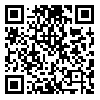Fri, Feb 20, 2026
[Archive]
Volume 38, Issue 1 (1-2024)
Med J Islam Repub Iran 2024 |
Back to browse issues page
Download citation:
BibTeX | RIS | EndNote | Medlars | ProCite | Reference Manager | RefWorks
Send citation to:



BibTeX | RIS | EndNote | Medlars | ProCite | Reference Manager | RefWorks
Send citation to:
Kabir A, Rasouli D, Soltani Arabshahi K. Comparing the Familiarity of the Basic and Clinical Faculty Members of Iran University of Medical Sciences with the Principles of Digital Professionalism. Med J Islam Repub Iran 2024; 38 (1) :88-93
URL: http://mjiri.iums.ac.ir/article-1-9030-en.html
URL: http://mjiri.iums.ac.ir/article-1-9030-en.html
Center for Educational Research in Medical Sciences (CERMS), Department of Medical Education, Faculty of Medicine; Iran University of Medical Sciences, Tehran, Iran , soltarab@iums.ac.ir
Abstract: (1639 Views)
Background: Due to the changing conditions of education, research, and treatment in the world, especially the recent pandemic, and more use of virtual space, there is a need for evaluation of digital professionalism in faculty members as the most influential people who have a direct and deep impact on the next generation.
Methods: In this analytical cross-sectional study that was conducted in 2023 on 149 faculty members of Iran University of Medical Sciences, they were invited to participate in the study through various methods (SMS, E-mail, and media messages). The link to the Persian standardized questionnaire was made available for participants. If a person received less than 70% of the score in each area, he/she would receive solutions to improve his/her situation in that area at the end of answering the questions. The self-administered questionnaire has 5 fields and 33 questions. Maximum scores were 10 points. Spearman and Pearson correlation coefficients and statistical tests consisting of chi-square, t-test, Mann-Whitney U, one-way ANOVA, and Kruskal-Wallis H were used in the analysis.
Results: The mean overall score of people in principles of digital professionalism was 0.8. Women and basic sciences faculties had a significantly better status than men and clinical faculties in the principles of digital professionalism as a whole (P = 0.001 and P = 0.049, respectively). The domain of “knowledge management and information literacy” had significantly lower scores in professors in comparison with other degree (instructors, assistant professors, and associate professors (P = 0.039).
Conclusion: The mean score of the principles of digital professionalism is acceptable at 80%. Coherent, timely, and up-to-date training to ensure the effective, safe and appropriate use of digital technology, especially for men, professors and clinical faculty members who had a lower score than others, should be done.
Methods: In this analytical cross-sectional study that was conducted in 2023 on 149 faculty members of Iran University of Medical Sciences, they were invited to participate in the study through various methods (SMS, E-mail, and media messages). The link to the Persian standardized questionnaire was made available for participants. If a person received less than 70% of the score in each area, he/she would receive solutions to improve his/her situation in that area at the end of answering the questions. The self-administered questionnaire has 5 fields and 33 questions. Maximum scores were 10 points. Spearman and Pearson correlation coefficients and statistical tests consisting of chi-square, t-test, Mann-Whitney U, one-way ANOVA, and Kruskal-Wallis H were used in the analysis.
Results: The mean overall score of people in principles of digital professionalism was 0.8. Women and basic sciences faculties had a significantly better status than men and clinical faculties in the principles of digital professionalism as a whole (P = 0.001 and P = 0.049, respectively). The domain of “knowledge management and information literacy” had significantly lower scores in professors in comparison with other degree (instructors, assistant professors, and associate professors (P = 0.039).
Conclusion: The mean score of the principles of digital professionalism is acceptable at 80%. Coherent, timely, and up-to-date training to ensure the effective, safe and appropriate use of digital technology, especially for men, professors and clinical faculty members who had a lower score than others, should be done.
Type of Study: Original Research |
Subject:
Medical Education
Send email to the article author
| Rights and permissions | |
 |
This work is licensed under a Creative Commons Attribution-NonCommercial 4.0 International License. |








